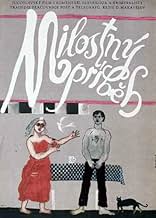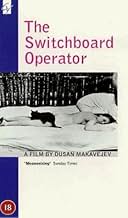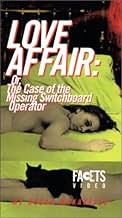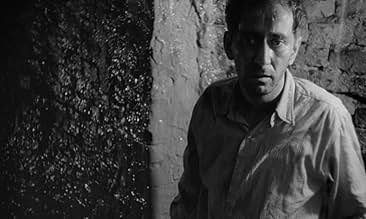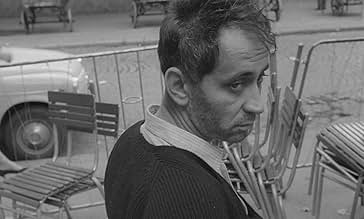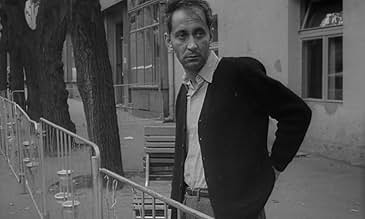Love Affair, or The Case of the Missing Switchboard Operator
Original title: Ljubavni slucaj ili tragedija sluzbenice P.T.T.
IMDb RATING
7.3/10
2.1K
YOUR RATING
A young female starts a love relationship with a serious young man. However, while he is away on business, she gets lonely and succumbs to her colleague's desires.A young female starts a love relationship with a serious young man. However, while he is away on business, she gets lonely and succumbs to her colleague's desires.A young female starts a love relationship with a serious young man. However, while he is away on business, she gets lonely and succumbs to her colleague's desires.
- Director
- Writers
- Stars
- Awards
- 2 wins total
Aleksander Kostic
- Ekspert za seksualna pitanja
- (as Dr Aleksandar Dj Kostic)
Zivojin Aleksic
- Ekspert za kriminalistiku
- (as Dr Zivojin L Aleksic)
Dragan Obradovic
- Obducent
- (as Dr Dragan Obradovic)
- Director
- Writers
- All cast & crew
- Production, box office & more at IMDbPro
Featured reviews
"It's still unclear who will rule the Earth in 100 years: people or rats." - hmm, are the rats already ruling?
Wonderfully offbeat, this is like a Yugoslavian version of a French new wave film, directed by Dusan Makavejev and starring the fantastic Eva Ras. It shows how subversively naughty it's going to be from the beginning, with a sexologist talking about the ancients worshipping giant phalluses, with cuts to lewd classical images. The story is simple, but how it's told is anything but. It has a switchboard operator (Ras) taking a rat catcher (Slobodan Aligrudic) as a lover, an affair which ends in tragedy.
Throughout the story we get various lectures, including a criminologist talking about modern CSI advances, wonderment expressed over a hen's egg, and a description of notable rat infestations in history, which finishes with a poem to them scrolling up the screen. We also get a window into some of the humbler aspects of life in Yugoslavia at the time, including the woman's apartment where she makes coffee using an iron and the couple sit down to watch a "good" television show, which turns out to be a communist parade with marchers advocating the closing of churches, then looters destroying one. His garret makes her place look like a palace, but they're happy together - in one scene she makes a delectable looking strudel from scratch, stretching the dough out to a thin sheet, and in another, he gets a contractor in to install a water heater for her so she can take a hot shower.
As the story is told in an interleaved way, with a flash forward to her on a gurney in preparation for a postmortem, we know it's going to end badly, and the film gradually fills in how. Along the way we get lots of references to sex which seem like an assurance that it's natural and healthy, including most obviously Eva Ras showing off her beautiful body, and a return of the sexologist to describe a painting that could be thought of as pornographic by Dorde Andrejevic-Kun. Even the door to door wool thrasher is on the make, asking a middle-aged lady "Want me to thrash you too?" to which she replies, "Oh, I was thrashed long ago, my friend." It's therefore ironic that underneath all of its flair, the film could also be seen as a morality tale, as the Hungarian woman who can't go without sex for too long gets pregnant and then killed.
The film seems wonderfully realistic, shot in the streets of Belgrade with real people sometimes staring directly into the camera, and including footage down a wonderfully dank city well. At the same time, it's very playful, alternating between things like the woman blowing big soap bubbles into being on her hands before breaking the 4th wall, a 360 degree revolution shot around Adam and Eve being reenacted by a couple, and soaring communist era patriotic music.
The main thing I didn't like was that the postman who is incredibly aggressive and annoying with his sexual advances eventually gets his way, the old "no means yes if you persist long enough" crap. I considered lowering my review score a bit because of it, but the truth is that I was delighted at how creative this was, especially coming out of Yugoslavia in 1967. I will definitely be checking out more of Makavejev's work.
Wonderfully offbeat, this is like a Yugoslavian version of a French new wave film, directed by Dusan Makavejev and starring the fantastic Eva Ras. It shows how subversively naughty it's going to be from the beginning, with a sexologist talking about the ancients worshipping giant phalluses, with cuts to lewd classical images. The story is simple, but how it's told is anything but. It has a switchboard operator (Ras) taking a rat catcher (Slobodan Aligrudic) as a lover, an affair which ends in tragedy.
Throughout the story we get various lectures, including a criminologist talking about modern CSI advances, wonderment expressed over a hen's egg, and a description of notable rat infestations in history, which finishes with a poem to them scrolling up the screen. We also get a window into some of the humbler aspects of life in Yugoslavia at the time, including the woman's apartment where she makes coffee using an iron and the couple sit down to watch a "good" television show, which turns out to be a communist parade with marchers advocating the closing of churches, then looters destroying one. His garret makes her place look like a palace, but they're happy together - in one scene she makes a delectable looking strudel from scratch, stretching the dough out to a thin sheet, and in another, he gets a contractor in to install a water heater for her so she can take a hot shower.
As the story is told in an interleaved way, with a flash forward to her on a gurney in preparation for a postmortem, we know it's going to end badly, and the film gradually fills in how. Along the way we get lots of references to sex which seem like an assurance that it's natural and healthy, including most obviously Eva Ras showing off her beautiful body, and a return of the sexologist to describe a painting that could be thought of as pornographic by Dorde Andrejevic-Kun. Even the door to door wool thrasher is on the make, asking a middle-aged lady "Want me to thrash you too?" to which she replies, "Oh, I was thrashed long ago, my friend." It's therefore ironic that underneath all of its flair, the film could also be seen as a morality tale, as the Hungarian woman who can't go without sex for too long gets pregnant and then killed.
The film seems wonderfully realistic, shot in the streets of Belgrade with real people sometimes staring directly into the camera, and including footage down a wonderfully dank city well. At the same time, it's very playful, alternating between things like the woman blowing big soap bubbles into being on her hands before breaking the 4th wall, a 360 degree revolution shot around Adam and Eve being reenacted by a couple, and soaring communist era patriotic music.
The main thing I didn't like was that the postman who is incredibly aggressive and annoying with his sexual advances eventually gets his way, the old "no means yes if you persist long enough" crap. I considered lowering my review score a bit because of it, but the truth is that I was delighted at how creative this was, especially coming out of Yugoslavia in 1967. I will definitely be checking out more of Makavejev's work.
To the newcomer, especially to a work like Love Affair or The Case of the Missing Switchboard Operator, it might appear that the filmmaker Dusan Makavejev has attention deficit disorder. The guy isn't interested in stories like your Pappy filmmaker John Ford was. He comes from a country that has been through the war and revolution, but he's well aware of what the moving image can give to the intended (or unintended) viewer. His style goes from one thing to another in a snap, without fair warning. This is why, perhaps, the best entry point into his career is the scandalous, hilarious politi-sex docu-drama-comedy WR The Mysteries of the Organism. Once you get through that, and you want more, you can go on to his earlier works such as this one.
In a way it's similar to WR in that it tells a very conventional, some would say uber-melodrama, story of a average-but-pretty switchboard operator who meets a rodent-catcher (aka sanitation worker) and they have a love affair. It has this, but Makavejev also cuts in clips from a sex doctor espousing about the nature of sex and phalluses in art, and how an egg is more than "just an omelet" and faces the audience directly with this. And, on top of this, we get every so often a fact about rodent over-populations and some political imagery and workers marching the in the street for good measure. For the filmmaker, this story of a girl and a man having a fling, mostly happy and only sad towards the end of their affair, when an unintentional betrayal occurs on the part of the girl, is just part of the woodwork, and we can take what we will what it means in context of rodents and sex... or a murder mystery for that matter.
Some of the film is amusing in its sudden movements and cutaways. Take the scene where Isabella is trying to work late and the guy that runs the switchboard keeps teasing her sexually, trying to have his way. She finally gives in, very reluctantly, and we see her face is devastated. Immediately this cuts to a very scratchy-grainy film stock showing "Adam and Eve", a naked man and woman, in a circling movement in various sculpture-like poses. What does this mean? Why does Makavejev throw this in here? Perhaps as a practical joke, or as one of those self-conscious beats akin to Godard. But for him, it could mean everything or nothing. We get some blatant nudity, but none of the sex is too graphic; it's about average people, then made non-linear by a (somewhat) average murder case, and then made extraordinary by its editing style and fresh outlook on Yugoslavian love and work.
In other words, expect a free-wheeling film that mixes real romance and satire, real documentary footage and breaking-the-fourth wall, melodrama and tragedy. It's not always exciting, and a little rough around the edges. For even the somewhat-fan of the director's, it's an anarchic treat.
In a way it's similar to WR in that it tells a very conventional, some would say uber-melodrama, story of a average-but-pretty switchboard operator who meets a rodent-catcher (aka sanitation worker) and they have a love affair. It has this, but Makavejev also cuts in clips from a sex doctor espousing about the nature of sex and phalluses in art, and how an egg is more than "just an omelet" and faces the audience directly with this. And, on top of this, we get every so often a fact about rodent over-populations and some political imagery and workers marching the in the street for good measure. For the filmmaker, this story of a girl and a man having a fling, mostly happy and only sad towards the end of their affair, when an unintentional betrayal occurs on the part of the girl, is just part of the woodwork, and we can take what we will what it means in context of rodents and sex... or a murder mystery for that matter.
Some of the film is amusing in its sudden movements and cutaways. Take the scene where Isabella is trying to work late and the guy that runs the switchboard keeps teasing her sexually, trying to have his way. She finally gives in, very reluctantly, and we see her face is devastated. Immediately this cuts to a very scratchy-grainy film stock showing "Adam and Eve", a naked man and woman, in a circling movement in various sculpture-like poses. What does this mean? Why does Makavejev throw this in here? Perhaps as a practical joke, or as one of those self-conscious beats akin to Godard. But for him, it could mean everything or nothing. We get some blatant nudity, but none of the sex is too graphic; it's about average people, then made non-linear by a (somewhat) average murder case, and then made extraordinary by its editing style and fresh outlook on Yugoslavian love and work.
In other words, expect a free-wheeling film that mixes real romance and satire, real documentary footage and breaking-the-fourth wall, melodrama and tragedy. It's not always exciting, and a little rough around the edges. For even the somewhat-fan of the director's, it's an anarchic treat.
Early on in his wildly experimental career, Dusan Makavejev was proving himself to be one of world cinema's most unique talents. With his brilliant, genre bending masterpiece "Love Affair", he crafts a simplistic, beautiful, and devastating portrait of one of film history's most tragic romances. Of course, Makavejev's vision is not limited by the boundaries of conventional storytelling and tone. Spliced in between the romantic tragicomedy are interviews with a sexologist and a criminologist, as well as various bits of stock footage depicting Yugoslavian politics.
This often weird and humorous version of a brutally sad tale is among my new favorite films thanks to its entertainment value, stunningly unique vision, wild sense of humor, and strong emotional impact. Makavejev pulls no punches, he allows the tragedy to burst in a chaotic explosion of tears, refusing to hold back. By the end, i was so struck with melancholy that I could hardly believe what I had just witnessed. This is a film that combines so many themes and genres, and yet manages to portray a semi-tradition story that anyone can follow. Sprinkling bits and pieces of the charmingly surreal and avant garde all over this saddening love story, Makavejev forms one of the finest, most unfortunately underrated and obscure cinematic romances of all time.
This often weird and humorous version of a brutally sad tale is among my new favorite films thanks to its entertainment value, stunningly unique vision, wild sense of humor, and strong emotional impact. Makavejev pulls no punches, he allows the tragedy to burst in a chaotic explosion of tears, refusing to hold back. By the end, i was so struck with melancholy that I could hardly believe what I had just witnessed. This is a film that combines so many themes and genres, and yet manages to portray a semi-tradition story that anyone can follow. Sprinkling bits and pieces of the charmingly surreal and avant garde all over this saddening love story, Makavejev forms one of the finest, most unfortunately underrated and obscure cinematic romances of all time.
Dusan Makavejev is probably not a name that most people will recognize, but film buffs should. In the late '60s he was part of a wave of Yugoslav filmmakers who changed the face of that country's cinema (much like Mike Nichols in the US) in what got called the Black Wave. Since lots of people in the US only learned of Yugoslavia from the horrors of the 1990s war in Bosnia, it might surprise them that the country had a thriving film industry for a long time.
Anyway, Makavejev's "Ljubavni slucaj ili tragedija sluzbenice P. T. T." ("Love Affair, or the Case of the Missing Switchboard Operator" in English) tells of a romance between a switchboard operator and a sanitation inspector. I figure that the movie must've been hard to make, given some of the explicit scenes. But more important is the point that the movie makes about relationships, and it doesn't hold back.
Like "Carnal Knowledge" and "Portnoy's Complaint", this movie shows that relationships are bound to come with complications. I recommend it to everyone.
Anyway, Makavejev's "Ljubavni slucaj ili tragedija sluzbenice P. T. T." ("Love Affair, or the Case of the Missing Switchboard Operator" in English) tells of a romance between a switchboard operator and a sanitation inspector. I figure that the movie must've been hard to make, given some of the explicit scenes. But more important is the point that the movie makes about relationships, and it doesn't hold back.
Like "Carnal Knowledge" and "Portnoy's Complaint", this movie shows that relationships are bound to come with complications. I recommend it to everyone.
This is not only a great little movie, but also a great time-capsule of late-'60s Yugoslavia (a nation since destroyed by way of violent imperialist intervention).
A young Hungarian woman and an older, Serbian man enter into a relationship under the internationalist, multi-ethnic, mid-twentieth century culture of communist Yugoslavia. This work contains scenes of beautiful, deeply moving, intimacy and sexuality.
The contradictions of this culture are made plain within the movie by reference to scenes from a Russian revolutionary film by Dziga Vertoz: Committed communist masses dismantle an old Cathedral- their cause is clearly popular and democratic, yet it is intolerant of an institution that has itself embodied intolerance for millennia. "Revolutionary", "scientific" humanity remains constellated within a dialectic of resentment.
Ultimately, human frailty destroys both the Hungarian and the Serbian. Misunderstanding and jealousy cause the lovers to turn on, and destroy, each other within the the terms set forth by this "revolutionary" society. Progress creates the illusion of enlightenment. But ultimately it is human nature that decides our fate.
This outlook ultimately qualifies writer-director Dusan Makavejev as a philosophical reactionary, albeit an exceptionally creative one.
A young Hungarian woman and an older, Serbian man enter into a relationship under the internationalist, multi-ethnic, mid-twentieth century culture of communist Yugoslavia. This work contains scenes of beautiful, deeply moving, intimacy and sexuality.
The contradictions of this culture are made plain within the movie by reference to scenes from a Russian revolutionary film by Dziga Vertoz: Committed communist masses dismantle an old Cathedral- their cause is clearly popular and democratic, yet it is intolerant of an institution that has itself embodied intolerance for millennia. "Revolutionary", "scientific" humanity remains constellated within a dialectic of resentment.
Ultimately, human frailty destroys both the Hungarian and the Serbian. Misunderstanding and jealousy cause the lovers to turn on, and destroy, each other within the the terms set forth by this "revolutionary" society. Progress creates the illusion of enlightenment. But ultimately it is human nature that decides our fate.
This outlook ultimately qualifies writer-director Dusan Makavejev as a philosophical reactionary, albeit an exceptionally creative one.
Did you know
- TriviaThe film was initially refused a UK certificate by the BBFC owing to shots of pubic hair, though the distributor himself partly ruined its chances by ignoring the film's creative aspects and instead telling censor John Trevelyan "I am sending you a film with a few tits in it. I don't think much of it but I can sell it to the sex theaters". It was eventually passed with minor cuts in 1969 and released fully uncut on video in 1996.
- Quotes
[first lines]
Ekspert za seksualna pitanja: I'm sure you must be interested in sex, and it's a good thing. It would be sad if you weren't. I too am very interested in sex.
- ConnectionsFeatured in Zabranjeni bez zabrane (2007)
Details
- Release date
- Country of origin
- Languages
- Also known as
- An Affair of the Heart
- Production company
- See more company credits at IMDbPro
- Runtime
- 1h 10m(70 min)
- Color
- Sound mix
- Aspect ratio
- 1.66 : 1
Contribute to this page
Suggest an edit or add missing content

